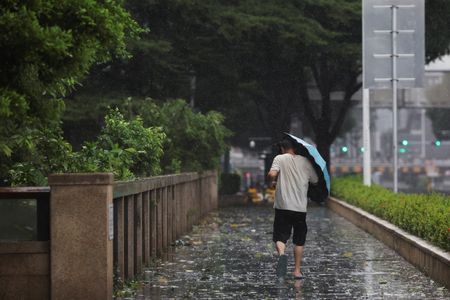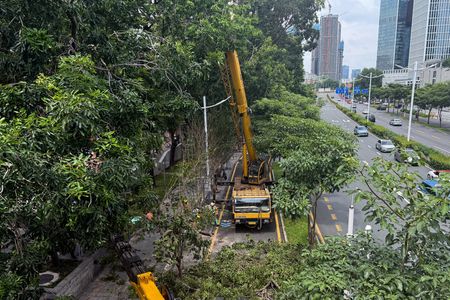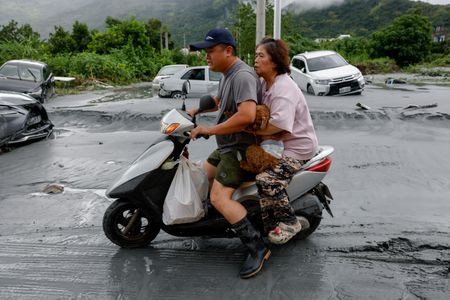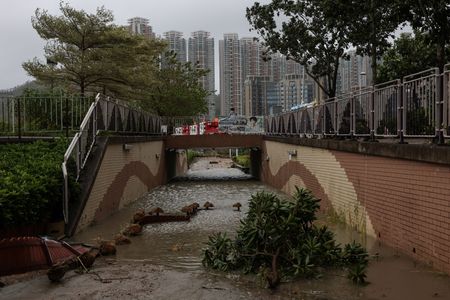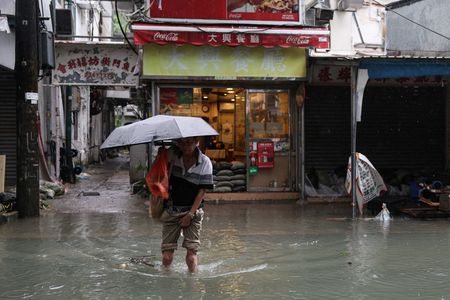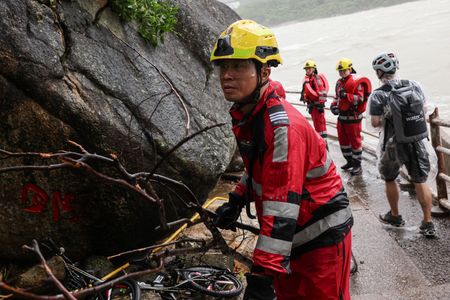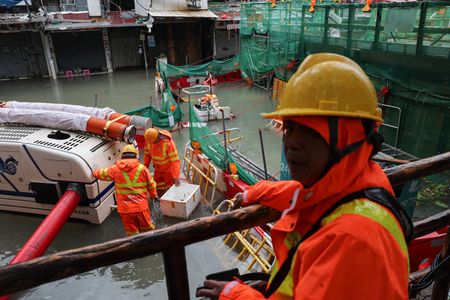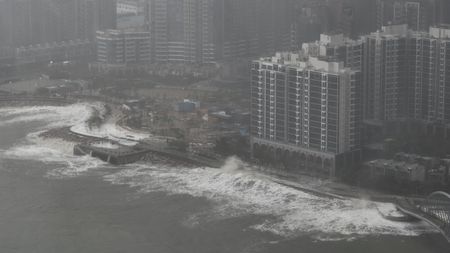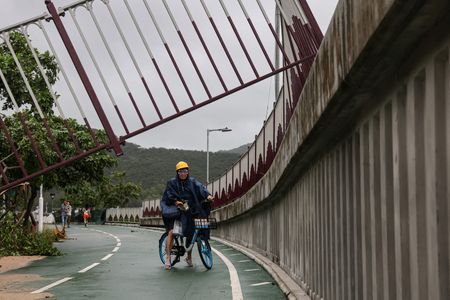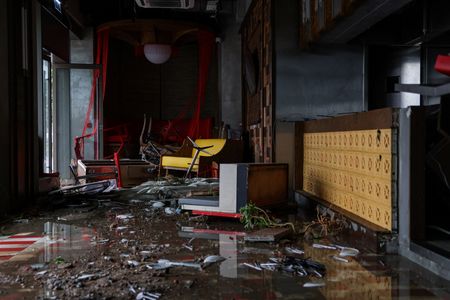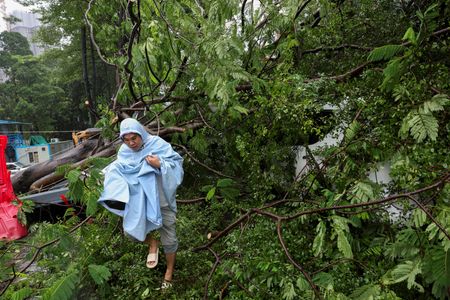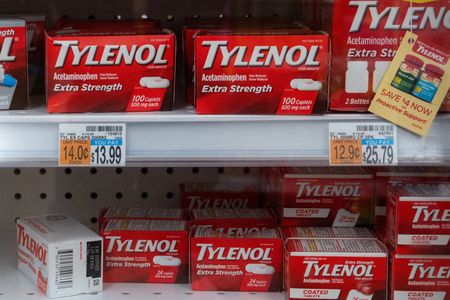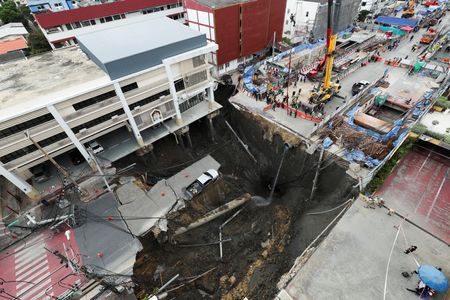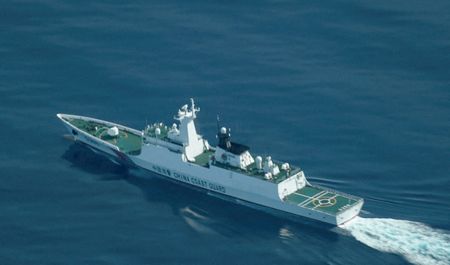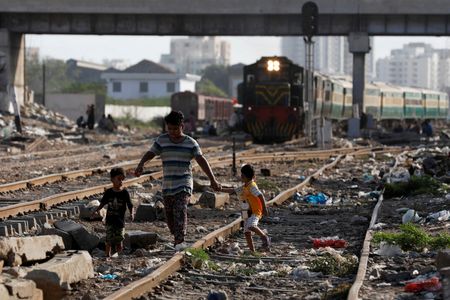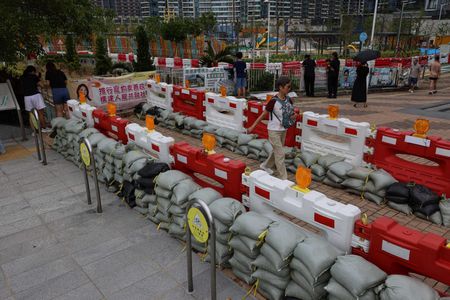By Jessie Pang and David Kirton
HONG KONG/SHENZHEN, China (Reuters) -Typhoon Ragasa, the world’s most powerful tropical cyclone this year, barreled towards tens of millions of people in southern China on Wednesday after killing 14 people in Taiwan, leaving scores missing and lashing Hong Kong with ferocious winds and heavy rains.
Some 129 people are missing in Taiwan’s eastern Hualien county, after a barrier lake overflowed and sent a wall of water into a town, the Taiwan fire department said on Wednesday, with Ragasa’s outer rim having drenched the island since Monday.
Many residents in the tourist town of Guangfu complained there was insufficient warning from Taiwan authorities, who are used to moving people out of potential danger zones swiftly on the island which is frequently hit by typhoons.
As rains inundated Taiwan, Hong Kong grappled with huge waves that crashed over areas of the Asian financial hub’s eastern and southern shoreline, breaking into white-water streams as they rushed along pavements and submerged some roads alongside residential properties.
At the Fullerton hotel on the island’s south, videos on social media showed a torrent of seawater surging through its glass doors before flooding the floor area. Calls to the property remained unanswered on Wednesday.
China’s marine authority issued its highest “red” wave warning for the first time this year, forecasting storm surges of up to 2.8 metres (9 feet) in parts of Guangdong province, as Ragasa charges towards the densely populated Pearl River Delta.
Ragasa formed over the Western Pacific last week. Fuelled by warm seas and favourable atmospheric conditions, the tropical cyclone rapidly intensified to become a Category 5 super typhoon on Monday with winds exceeding 260 kph (162 mph).
It has since weakened to a Category 3 typhoon, which is still capable of bringing down trees and power lines, shattering windows and damaging buildings.
“Authorities have taken lessons from Hato and Mangkhut, which both caused billions of dollars in damage in 2017 and 2018,” said Chim Lee, a senior energy and climate change specialist at the Economist Intelligence Unit.
“The Pearl River Delta is one of the best-prepared regions for typhoons, so we’re not expecting major disruptions. One change this year is that the Hong Kong stock market has stayed open during typhoons – a sign of how resilient the infrastructure has become,” he added.
That said, Zijin Gold International delayed its $3.2 billion IPO in Hong Kong on Wednesday.
CHINA BRACES FOR LANDFALL
After passing around 100 km (60 miles) south of Hong Kong over the next few hours, Ragasa is expected to make landfall along the south Chinese coast in the late afternoon.
Guangzhou, Shenzhen, Foshan and Dongguan, the largest cities in the storm’s path, are home to around 50 million people.
The emergency management ministry dispatched tens of thousands of tents, folding beds, emergency lighting equipment and other rescue supplies to Guangdong on Tuesday, Chinese state media reported, while over 770,000 people have been evacuated.
Some shops and restaurants in the province parked large rented trucks in front of their storefronts in a bid to shield them from the storm, local media reported.
“We live on an upper floor and saw there wasn’t too much danger, so I brought the kids out to experience this heavy rain and wind,” a 40-year-old Shenzhen resident surnamed Liang said. “We walked along the open road to make sure to stay safe.”
A crowd chasing the storm under Shenzhen Bay Bridge were moved on by traffic police, a Reuters witness observed.
“The typhoon was really intense, but I’ve not been out long,” said an electric scooter delivery driver who goes by the name of Tim and was using his vehicle to move around and assess the damage.
“It’s a lot of fun, but it’s also dangerous. I wanted to ride around the waterfront, but it’s too dangerous, so I had to come back onto the bridge.”
China’s marine authority warned of a high risk of flooding in Shenzhen, especially in low-lying areas, with a storm surge alert expected to remain in effect until Thursday.
A woman and her five-year-old son were swept into the ocean on Tuesday after watching the typhoon from the Hong Kong waterfront, according to the South China Morning Post, which said they were now in intensive care.
Hong Kong lowered its typhoon signal to 8 from 10 just after 1 pm (0500 GMT) on Wednesday, keeping the city locked down.
The hospital authority said at least 50 people had been injured by the typhoon, while the government had opened 50 temporary shelters, within which 791 sought refuge.
In the gambling hub of Macau next to Hong Kong, casinos were forced to shutter their gambling areas. Guests are not able to leave their property if they are staying there. One user on China’s Xiaohongshu app showed videos of doors being sealed at a casino resort for protection against gales and debris.
(Reporting by Anne Marie Roantree, Jessie Pang and the Hong Kong newsroom; David Kirton in Shenzhen, Ben Blanchard in Taipei, Joe Cash in Beijing and the Beijing newsroom; Writing by Farah Master and Joe Cash; Editing by Lincoln Feast, Michael Perry, Stephen Coates and Saad Sayeed)

